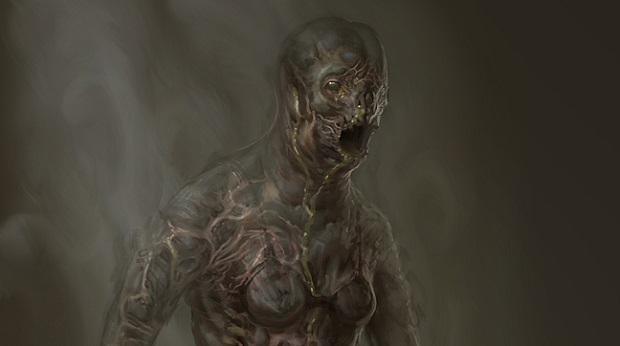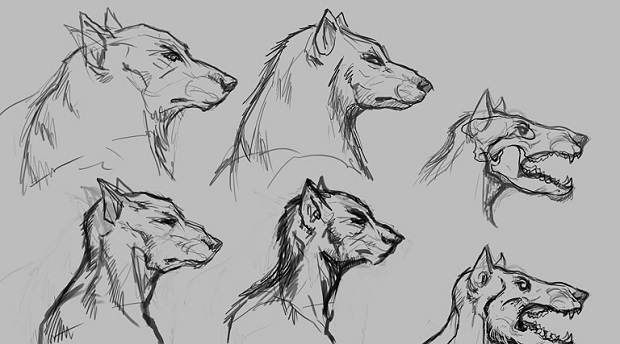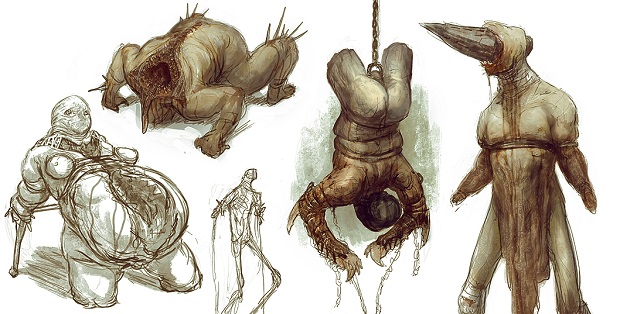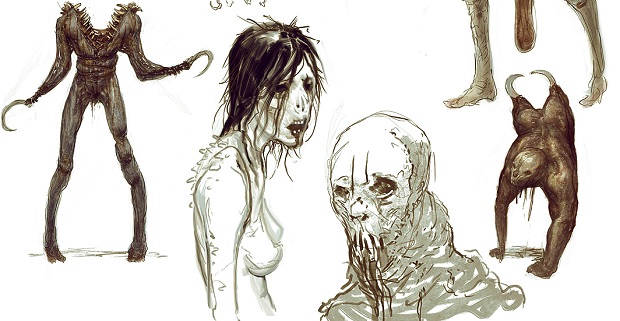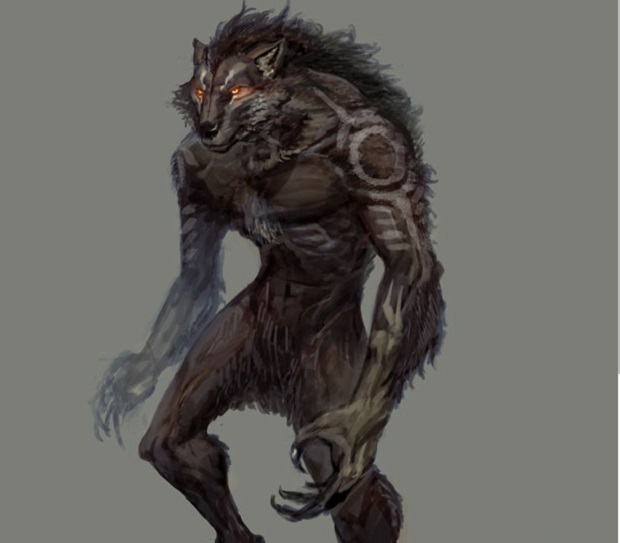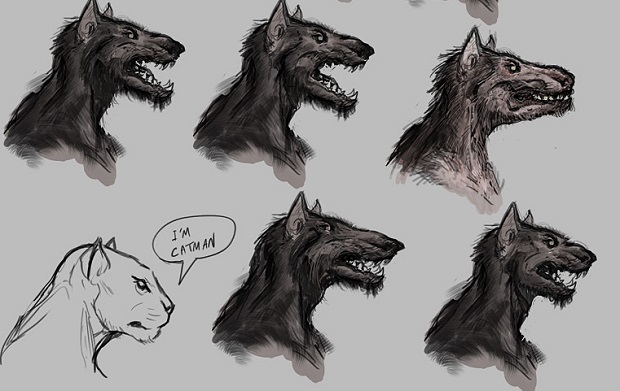White Wolf and the World of Darkness revival: "Asking 'when will you rage?' has never been more relevant"
"This isn't Captain Planet"
Last week, I sat down with Martin Ericsson, lead storyteller at White Wolf, publishers of the World of Darkness RPG systems and interwoven storylines. It's a strange and exciting time for the company, who are about to step back into the spotlight after a decade-plus drought of digital games since 2004's much-loved Vampire: The Masquerade - Bloodlines. For much of that time Ericsson and colleagues were locked into a licensing deal with CCP, working on the ill-fated and never released World of Darkness MMORPG, but now they're ready to begin a new generation of stories.
We talked about the recently announced Werewolf: The Apocalypse game and how its werewolves act as nature's remedy to mankind's ills, as well as that MMO and the broader shape of White Wolf's future. Along the way we discussed punching Nazis, why now is the perfect time to get angry, and how World of Darkness is about the here and now as much as its own mythology. This isn't just one game, it's the rebirth of a world.
(I've included links to the White Wolf wiki for terms you might not understand; if it's in red, a click should help)
RPS: I spoke to you way back when Paradox bought White Wolf and now here we are at a Focus event.
Ericsson: This goes back to how we set up the deal. The Paradox group are financing us, it's not Paradox who bought us, and we're not an internal studio in any way. We're the licensing company that develops a meta-plot, that ended with the Gehenna and Apocalypse books in 2004. We're pulling back the timeline to slightly before the Gehenna books, and now we're in the Age of the Apocalypse. It might be a hundred years before the world falls, but we're solidly in it now. This is the age of the final battle.
RPS: Because it's been so long since we've had a White Wolf game, could you talk about why it's taken so long? And what does going back to digital games let you do, in a storytelling sense, that you can't do on tabletop?
Ericsson: The first question is pretty easy. It's because at CCP, I was one of the content designers on the MMO World of Darkness, and the strategy we took there was to put all our eggs in one basket. We wanted to make the most awesome, content-heavy MMO, and then content-heavy MMOs went BAM, into the sink. We saw Knights of the Old Republic fail and Warhammer Online crash.
We were in the middle of MMO death, so we tried to rescope, and we tried to do that by doing something in CCP's style, which is emergent player-based stories. But we were a bit too late, and we maybe tried to bite off a bit more than we could chew.
During that time, all licensing deals were off. We kept Onyx Path because that was the old passionate writers, the people who really knew the lore, and who were working on 20th anniversary editions of the books – nostalgia editions for fans.
I was heartbroken when this happened. I had sold my apartment, my girlfriend had broken up with me. The whole thing crashed before my eyes and I thought “what the fuck am I going to do now?”
Fortunately, there was a connection between me and the Paradox group and we could make something happen. Now, a year later, there is a lot of stuff that we've done that we can't talk about at all! But rest assured, the idea of having different products that feed into one another into one big brand, with a connecting meta-plot, that's what I'm working with 60% of my time. We're figuring out what has happened between 2002 and today, in the World of Darkness.
How have our supernatural nations and factions reacted to the situation in the Middle East, the war on terror...
RPS: I think one of the appeals of White Wolf is not just that you're storytellers, who also enable other people to tell stories, but that those stories are parallel to the real world. The topical mythos.
Ericsson: (laughs) Absolutely.
RPS: But to go back to my second question, what do those stories gain from being told on a computer rather than in a social group? Bloodlines is still such a beloved RPG, but does that fit with the ideas you're talking about now? Can we expect more of the same?
Ericsson: On the subject of Bloodlines, one of the first things that happened when the news hit was that Activision called us and said, “can you tell us why this game is selling so well on Steam still?” And we say because it's awesome, and because you're the only modern day, proper, adult, gritty vampire game. Go figure.
And of course we want to do more of that. But now, we've grown from our twenties to our forties, so we can tell more sophisticated stories now, and the computer games medium is in another place entirely. We feel more kinship to indie game developers who want to ask big questions. World of Darkness has always been punky and questioning authority, and that fits with the indie scene much more than it does with big studios.
World of Darkness has never been a safe place. It's never been a fantasy place where you are protected from the harsh realities of life; it's reality but worse, more terrifying.
RPS: That's becoming harder and harder to achieve.
Ericsson: Precisely! And that's why we're facing it head-on. We are the ones who aren't afraid of asking these questions. Of course, our werewolves are nature's vengeance. They are the immune system of the planet and the plot point we're at with them is that they're thinking of restarting the Impergium. That is where we are. They spared us thousands of years ago, to ensure we only stayed in family groups and that we are nomadic, but they spared us because they are half human and half wolves.
RPS: But now they're sick of our shit?
Ericsson: Yeah! The humans have had their time. Did they do well? No. Did they fuck it up? Yes, pretty much as badly as they could have fucked it up!
So now there is this very tense situation within the Garou nation, where the Glass Walkers say humans still have a shot and that they can use technology to get out of the situation. “Look at Elon Musk,” they'd say, though maybe he is a Glass Walker. On the other hand are the Red Talons who say, “look at the rate of species extinction; listen to all the dead spirits of extinct species we're talking to, screaming for vengeance. Let's go kill them.”
And in between all of that you have all of the other tribes who have their own ideas about how to deal with humanity and what we've done wrong. The Black Furies are a matriarchal clan who don't want to help the humans until they sort out their gender rights, The Get of Fenris who just laugh at all of those social aims and say it's about survival of the fittest, and they should go into all-out war to see if humans can survive.
So it's not Captain Planet. It's nature red in tooth and claw.
RPS: And how does this work in a computer game?
Ericsson: You will play the werewolf. You will play the monster. We're in pre-pre-pre-production so I can't talk about details, but the basic questions are: “When will you rage? When will you use violence? When will you have had enough?” But there's an important follow-up, which is, “what is the price of changing the world through violence?” Those two questions go hand in hand.
Part of the IP is for the werewolves themselves to question whether it's at least partly their fault that the world is as it is, because they've used violence to solve problems in the past. That is on their shoulders. The balance between gnosis and rage is a super-interesting thing to play with. These things have mechanical effects; it's not just light side and dark side. It affects how long they can maintain their forms, or how they can work with spirits.
There will be scenarios like, you meet a bunch of loggers: do you rip their heads off or do you actually listen to them and realise that they have no choice, that their families will starve, that they are unwitting cogs in a machine.
The pack is central too, so some kind of pack mechanic will be involved in this. Whether you'll be the pack alpha or if you will rotate between characters, we don't know yet. But we need a pack. We probably need a multi-tribe pack to represent the traditions of the Garou nation. In this world, we can play with the tropes that are the tribes, going against expectations and making sure we don't end up with the standard RPG party.
RPS: So the Werewolf game will be an RPG. But are you considering other genres for other parts of World of Darkness. I have the dream of the Crusader Kings II Vampire grand strategy game. I'm not asking you to confirm or deny that such a thing might exist right now, but are you interested in exploring the world in that way, as well as through more traditional roleplaying?
Ericsson: Oh yes. Absolutely. But with Werewolf, we asked ourselves, what genres make sense. A brawler maybe? I can see that in the right format, there's lots of strong character designs and powers. But an isometric RPG would make lots of sense too, like a Baldur's Gate style. Shape-changing comes with some influence on perspective; first-person is a pretty cheap way to do shape-changing (laughs). But not very exciting. We feel we need to pull back the camera for transformations, at the very least.
So to go back to the original questions: what can we do with these worlds when we go digital rather than tabletop and why now? Well, for 'why now?', I'd say this: have you ever been in a time when the question “when will you rage?” feels more relevant? That's why we wanted to announce now. This is the time to get pissed! But also to think about the consequences of getting pissed.
RPS: I see conversations on Twitter almost every day right now about whether it's ok to punch a Nazi.
Ericsson: Exactly! This is a game that wants you to consider that question and to take it further. Is it ok to kill to save an ecosystem? We don't want to provide ready-made answers – the Garou have their own answers, of course, and so do their enemies and the mortals in between. But we're considering branching narratives and so on, because we want people to play with these questions and maybe learn something. Think about whether to fucking act right now or to find compromise.
RPS: There's a lot of history and a lot of lore, but this will be the first White Wolf story for a lot of people. How do you make it work for newcomers, and is Vampire still the most well-known property?
Ericsson: Yes. Partly thanks to Bloodlines.
RPS: I'm an old man who has been a PC gamer for a long time; is Bloodlines still finding a new audience, or is it mostly people like me?
Ericsson: Oh yes. I meet people all the time, all age groups including younger kids, who love Bloodines. It's a game that takes the maturity level of the player seriously and it's still different from many other games. For us it was very clear that there is still an audience looking for that.
We're doing other projects too though. Two mobile games called Preludes, which take people from mortal to vampire, or from sleeper to awakened. The first is a Vampire game, which has two freshly made vampires in LA chatting over a messenger app, trying to work out what's going on. It's very contemporary and it's about class in the US. The other is a Mage: The Ascension game set during the War for Reality, at the backdrop of the refugee crisis of 2015, looking into perceptions of people. Are they a threat or are they neighbours we don't know yet?
White Wolf has always worked partly as a metaphor for current events and this is a good time to be back because we have loads to talk about.

